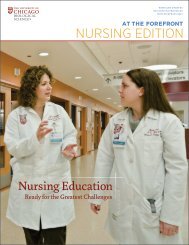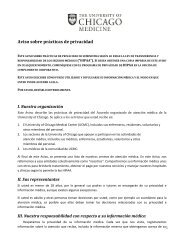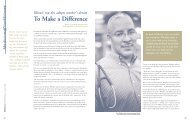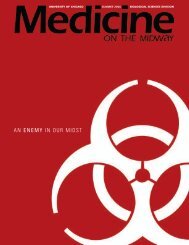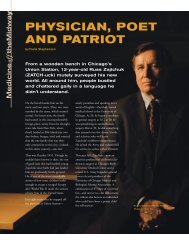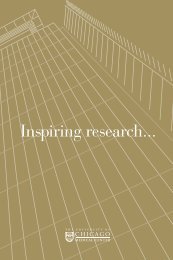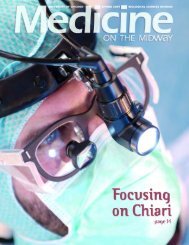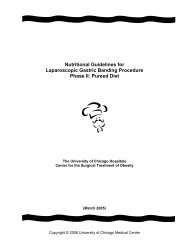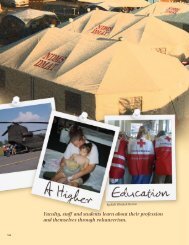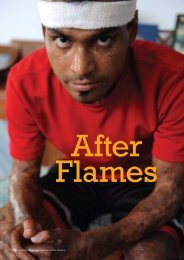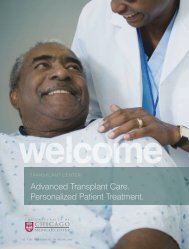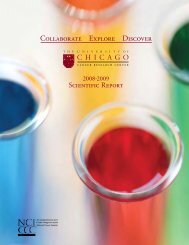AT THE FOREFRONT OF OUR COMMUNITY
2011 Community Benefit Report: The University of Chicago Medical ...
2011 Community Benefit Report: The University of Chicago Medical ...
- No tags were found...
You also want an ePaper? Increase the reach of your titles
YUMPU automatically turns print PDFs into web optimized ePapers that Google loves.
Improving Urban Health: Cancer PreventionOn a drizzly Sunday afternoon undera tent on Chicago’s Southwest Side,Karen E. Kim, MD, MS, assembled ateam of volunteers to offer free flushots, blood pressure screenings andcancer education to several thousandpeople who had gathered for theChicago Latin American SoccerAssociation championship games.Spectators of all ages — from toddlers to a 104-year-oldwoman — and even some of the soccer players stopped bythe tent shared by the University of Chicago ComprehensiveCancer Center and the American Cancer Society.The event was part of a Comprehensive Cancer Centeroutreach program that offers culturally and geographicallycustomized information about cancer risk, prevention andtreatment. In fiscal year 2011, Kim’s group visited more than7,000 people at 36 community events.“Cancer is not homogeneous,” Kim said. “Not only are the risksdifferent for every racial and ethnic group, but there also aregeographic differences. For example, one out of every threecancer diagnoses in American women is breast cancer, andwe’ve found that the breast cancer death rate is much higher inChicago than in New York City or in the U.S. as a whole.”Community outreach and engagement are essential toaddressing the unequal burden of cancer carried by manyracial and ethnic groups, particularly in a major metropolitancity with a diverse population such as Chicago. Each ethnicgroup has its own health risks. Black men have an elevatedrisk of prostate cancer. Hispanic women experience a highincidence of cervical cancer. Asians and Pacific Islanders have aheightened chance of developing liver and stomach cancers.To reach the different ethnic groups, the program partnerswith community and faith-based organizations such as theApostolic Faith Church, American Indian Health Serviceof Chicago and the Asian Health Coalition. Through suchcollaborations, Kim’s group is able to not only tailor outreachefforts to each community, but also to teach communityleaders to become health advocates.Jennifer Burns, CPNP, director of the Pediatric and Family TravelClinic, administers a flu shot to a 104-year-old spectator at the2011 Chicago Latin American Soccer Association championshipgames. The free shots were part of a cancer outreach event.“Being a partner with the University of Chicago has beenan empowering experience,” said Asian Health CoalitionExecutive Director Edwin Chandrasekar. “I really appreciate thecommitment to recognizing the integral role the communityplays in the fight against cancer.”IN FISCAL YEAR 2011:DID YOU KNOW?University of Chicago Medicine36CANCEROUTREACHEVENTS7,000+<strong>COMMUNITY</strong>PARTICIPANTSEVENTSCONDUCTED IN:ENGLISHSPANISHCANTONESEKOREANVIETNAMESEAFRICAN AMERICANSare more likely to develop cancer thanany other racial or ethnic group.HISPANICShave a higher rate than whites of cancers associatedwith infection, such as uterine, cervical, liver andstomach cancers.ASIAN AMERICANShave the highest incidence of liver cancer.AMERICAN INDIANS/ALASKAN N<strong>AT</strong>IVEShave the highest kidney cancer death rate.14



